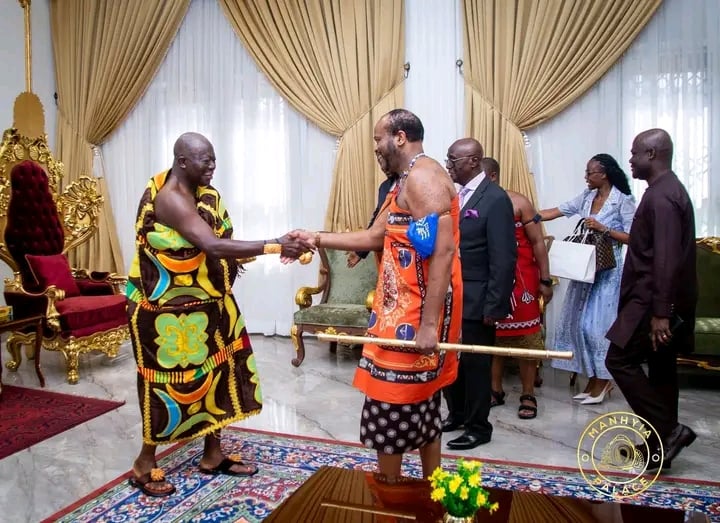Professor Joseph Kwasi Agyemang, Professor of Accounting Sciences at the University of South Africa (UNISA) and the University of Eswatini, has asserted that the visit of King Mswati III of Eswatini to the Asante Kingdom will significantly strengthen the relationship between Asanteman and Eswatini. He believes the visit also promotes the exchange of cultural beliefs and values between the two kingdoms.
“Visits like this are vital in reminding us that, as Africans, whether from the West, South, East or North, we are one people. The Asantes are known for their hospitality, and such goodwill strengthens bonds between Ghanaians, especially Asantes and Swazis in both Eswatini and Ghana,” he added.
According to Professor Agyemang, the two symbolic gifts presented by the Asantehene, Otumfuo Osei Tutu II, to King Mswati III represent meaningful connections between the two royal houses. He explained that the ‘Tontonsansan’, a traditional communication device placed beneath the Golden Stool, symbolizes prosperous and sustainable kingdoms. The ‘Unity Staff,’ adorned with the Oyoko Clan emblem of a hawk and a lion, symbolizes vigilance, clear vision and boldness, representing unity and the shared commitment to embracing diversity while advancing mutual development.
He further emphasized that the unity forged through cultural exchanges, including intermarriages and citizen relocations, contributes to cultural sustainability and long-term prosperity for both kingdoms. “Plenty wealth distinctly connects the two Kingdoms to long-term prosperous growth within sustaining restraint despite external pressures”, he stated.
On the diplomatic and cultural importance of the royal engagement, Professor Agyemang highlighted its symbolic role in promoting continuity and unity between the two nations. He described it as a powerful tool of public diplomacy that could enhance international relations by improving the global image of both Ghana and Eswatini, fostering national pride and stimulating tourism and economic development.
Again, he noted that it creates an avenue for collaboration between the creative industries of the two countries. “It will serve a good platform for the artisan and movie industries of the two nations to interact with each other to share what they have in common and to learn from each other,” he said. “I wouldn’t be surprised if Ghana’s movie industry soon produces a film with a Swazi context”, he added.
Addressing how the visit could strengthen connections between the Eswatini community in Ghana and Ghanaians living in Eswatini, Professor Agyemang said the visit could serve as a catalyst for enhancing bilateral trade relations. This, he suggested, may lead to collaborative ventures that take advantage of the African Continental Free Trade Area (AfCFTA) for shared benefit. He underscored the importance of embracing a common African heritage: “It is essential for both nations to recognize one another as siblings from different countries, united by the same African beliefs, values and norms. By fostering this sense of kinship, we can work together towards a prosperous future for both communities”.
As a faculty member at the University of Eswatini, Professor Agyemang expressed optimism about opportunities for academic collaboration between the University of Eswatini and the Kwame Nkrumah University of Science and Technology (KNUST). He believes the King’s visit will open doors for partnerships in areas such as exchange programmes, research, curriculum development and scholarship schemes. “This could be done through collaborations among the various departments, faculties, schools and colleges in the two universities,” he noted.
Speaking on the role of traditional leadership in advancing pan-African academic and cultural partnerships, Professor Agyemang emphasized its importance in bridging the gap between indigenous knowledge systems and modern academia. He argued that traditional leaders play a vital role in preserving and sharing cultural practices and ensuring they are meaningfully integrated into today’s educational systems.
“Cultural exchange programmes help students and academics across Africa learn from one another, fostering collaboration and mutual respect”, he added.
He also revealed that King Mswati III’s visit has led to the announcement of additional scholarships for Eswatini students at KNUST. This development, he said, paves the way for expanding student exchange programmes and fostering cross-cultural learning and the exchange of academic expertise across various disciplines.


